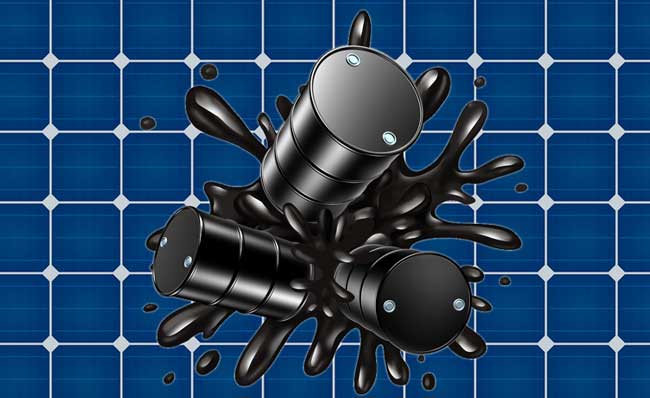When the Saudi oil minister says his country will switch to solar you know the jig is up for fossil fuels. Such a defining moment occurred in Paris this week when Reuters, the Financial Times and The Guardian all reported Minister Ali Al-Naimi as admitting the days of oil exports in his country were limited.
The comments were delivered to attendees of a climate and business conference where Naimi outlined a new direction for Saudi Arabian exports.
“In Saudi Arabia, we recognise that eventually, one of these days, we are not going to need fossil fuels, I don’t know when, in 2040, 2050… so we have embarked on a program to develop solar energy,” Ali Al-Naimi told the conference.
“Hopefully, one of these days, instead of exporting fossil fuels, we will be exporting gigawatts, electric ones,” he added.
Now the minister wasn’t foreseeing the end of energy derived from fossil fuels just yet. However his admission that oil may be on the way out will have many fossil fuel acolytes and their elected mouthpieces worried. Is the minister advocating a solar-for-oil swap? Not just yet apparently though Naimi’s comments seem to suggest this may be a medium-term aim for the oil-rich nation. In fact research shows that Saudi Arabia has been preparing for a “solar rush” for some time, developing their renewable energy industry in expectation of an oil slowdown.
According to a study by Canadian-based market research company TechSci Research, Saudi Arabia is experiencing a big solar boom with solar power expected to contribute 41 GW of overall power capacity additions by 2032.
This should make peak oil enthusiasts sit up and take notice. Are the Saudi moves away from fossil fuels a sign that peak oil is closer than we think? Or have we already reached the point of no return for maximum oil consumption? No-one would be in a better position to judge this that the Saudis who control the second largest of proven oil reserves in the world after Venezuela.
Some may consider the oil minister’s comments in Paris as an admission that oil’s days are numbered as a viable export, that peak oil has occurred and this is the end for fossil fuel. However, perhaps most strikingly, Naimi went on to tell his audience that he didn’t believe that the current low price of oil would affect solar power’s viability.
“I believe solar will be even more economic than fossil fuels,” he told the conference.
The Saudi oil minister’s honest — and brutal — comments will not go down well in the fossil fuel boardrooms. If correct, Naimi’s comments signify the end of fossil fuels as the dominant energy source in a shorter time frame than many have predicted. Dare we say: Here comes the Sun?


 RSS - Posts
RSS - Posts



Saudi’s move to solar may well be in part driven by the ongoing decline of the Ghawar oil field, the largest conventional oil field in the world. Since the mid-60s, oil production has been enhanced (forced) by injecting seawater to maintain the pressure of oil being withdrawn. Exact reserves are hard to come by since we can only rely on what the Saudis tell us but, oddly, the reserves in this field never seem to decline despite it producing 5 mbpd. I’d bet the Saudis know they can’t keep up the fiction of their never-reducing reserves forever, and are starting to think long-term about what happens when they run out. Rather than a slow decline, their oil production could well fall off a cliff over a short period of a decade or so. And since the only thing keeping the kingdom politically stable is the fantastic wealth from oil, that could mean the end of the House of Saud, which will be occupying their minds as well. There is an old desert saying: “My father rode a camel. I drive a Rolls Royce. My son has a private jet. My grandson will ride a camel.”
Thanks Ted, some very useful information there. Great saying too.
I dunno… these guys have ‘admitted’ things like this before, as have even the big oil companies. I doubt they’re tipping us off to some closely-held information for our own good. They’re either trying to pump up the perceived scarcity of their main product, or attract investors. Or maybe, super-spy sort of stuff, steer the rest of the world into investing in solar rather than oil infrastructure so that they can stick it to us later.
You could also say they’re stating the obvious and there’s nothing to see here…
I’ll believe in a big shift when there’s an materials-to-product solar powered solar panel industry someday. Or even a single plant (yes, I know they have panels on the roofs for lights, but I mean solar powering the energy intensive industrial manufacturing processes).
Thanks for your input Greg. Interesting — and valid — points.
Irrespective of its oil assets, Saudi Arabia has an ideal solar energy asset: lots of sun and cloudless skies.
If you have more money than you know what to do with, it’s an easy matter to capitalise on yet another natural energy resource.